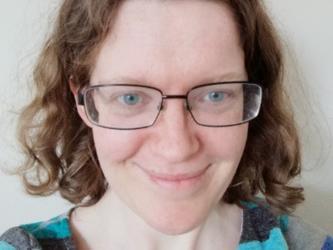Disability Pride Month: Scientisting with a Disability
The loose thumb finger of my glove dropped into the pink media as I lifted the lid off the dish of cells. Contaminated. Probably. I groaned and contemplated whether to discard the dish, berating myself for carelessness. How could I have forgotten to fold in the empty finger? Accidents like this have become more sporadic in my progression as a research scientist, but when they do occur, they still sharply remind me that I am in a lab space that was not made to fit people like me. I don’t say that self-pityingly, since it would be impossible to tailor lab spaces and equipment to meet the needs of every different body using them. No, I mention it simply to illustrate that navigating even “minor” disabilities as a scientist can make one painfully self-conscious. Scientific training systems largely inculcate a sink-or-swim attitude that suggests if people can’t quickly pick up functional experimental praxes, they don’t belong in the lab. This ethos is damaging for those who need a longer time to find their feet. Or hands.
When I was learning new techniques, I was not simply studying them to copy in a “monkey see, monkey do” fashion. I was calibrating, considering my own limits and imagining how my body could achieve the same outcome. Especially in the beginning, that made me a slow study, and liable to dropping or spilling things. It was hard not to feel shame when those training me got frustrated. Despite my love for reading and writing science, I developed anxiety about doing lab work, without being able to articulate why. If I could now, it would simply be this: “Please be patient. I am not simply learning how to mimic your movements. I am studying the salient features of the experiment so that I can create a way of repeating the protocol faithfully with my own hands.”
Thankfully, early in my PhD I had a lab mentor who realised the importance of giving me time to recalibrate experimental training. His patience was invaluable. I remember messing up an experiment that had taken hours to set up and run, because of a clumsy left-handed mistake. I’m not proud of it, but I wordlessly left the lab in tears and only returned an hour later. However, there was no recrimination when I came back. Just, “I wasn’t sure if you’d come back, so I tidied things.” It was a turning point for me, to have somebody who would not only not get frustrated with me for taking longer to learn things but would also give me the space I needed to process my disappointment at failures. Here was the patient support I hadn’t realised I needed. It gave me the freedom to relinquish some of my self-consciousness about recalibrating.

With practice, I was able to evaluate and adjust protocols to suit my body much faster by the end of my PhD than I had at the start of it, but the self-doubt that sits heavily on many incoming students was definitely exacerbated by my disability. There is a particular cognitive load that comes with navigating lab work while disabled. You have to discover your own limits, iteratively determining whether you’re not good at a technique because you’re new to it, or because it’s something that will always be inherently challenging (so you’d better choreograph your own way of doing it). You have to learn not to worry what others think about unorthodox, albeit effective, ways of doing things. Later, you have to work out how to demonstrate techniques to trainees when your way differs from “normal.” It gets easier.
Finally, there are also other people to consider. This has been a mixed experience for me: I personally appreciate it when people around me consider that a particular task might be particularly challenging for me (like pouring from a carboy) and offer to help. I know some people refrain from offering in deference to my independence, so I try to give people the benefit of the doubt. I’d like to iterate that people with disabilities are individuals: for some the harder task is having to ask for help and for others having to refuse unneeded assistance is the burden. There isn’t a formula. But try to refrain from comments like “You’re so competent I forget you’re disabled.” It’s hard to know how to react to that sort of thing.
Image: iStock/Inventori
